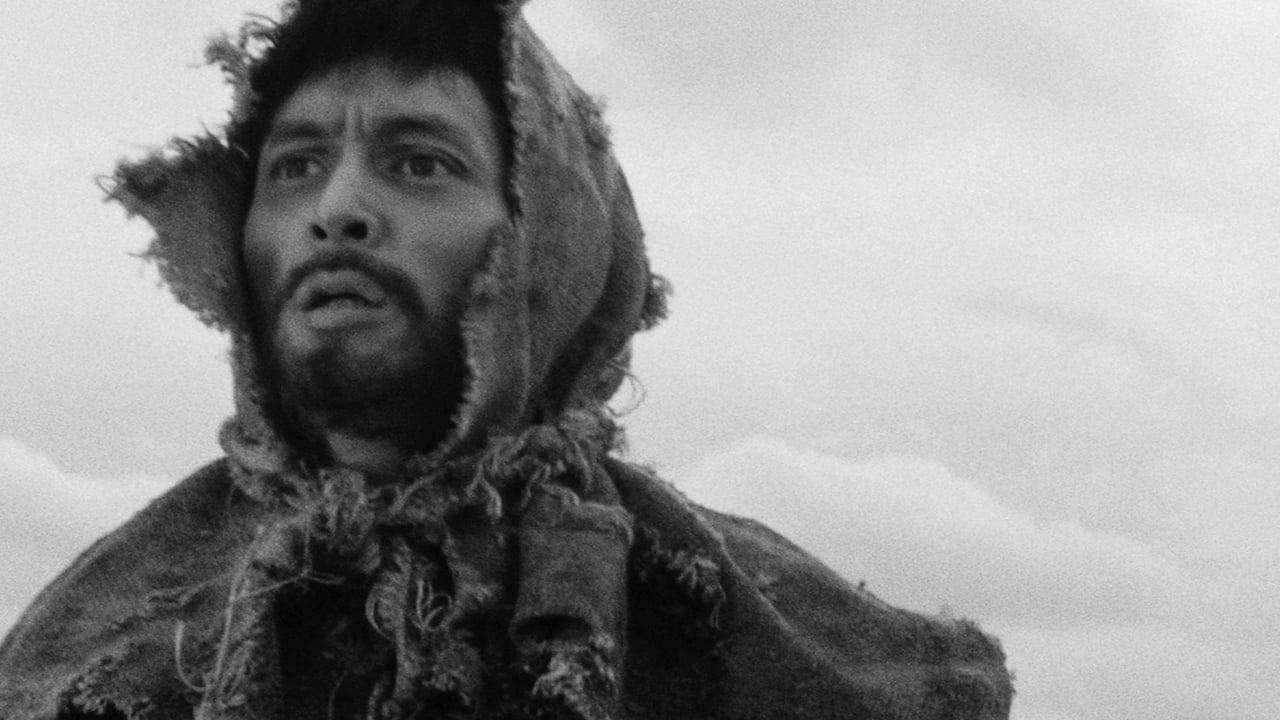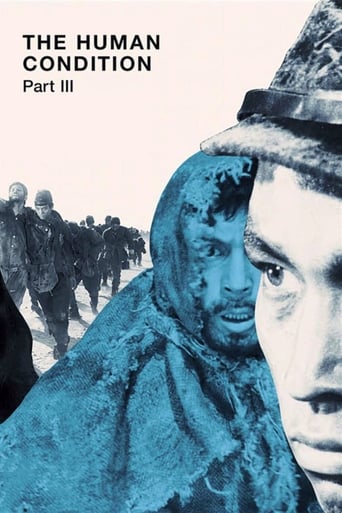Spoonixel
Amateur movie with Big budget
Matrixiole
Simple and well acted, it has tension enough to knot the stomach.
Micah Lloyd
Excellent characters with emotional depth. My wife, daughter and granddaughter all enjoyed it...and me, too! Very good movie! You won't be disappointed.
Kayden
This is a dark and sometimes deeply uncomfortable drama
Gerard Hosier
This trilogy was a grueling and rewarding. It was chilling to watch but I persevered. It was about the conflict between nationalism and the individual struggling for humanism. If you transfer yourself to post WW2 Japan you could see how powerful this film was. It was necessary for the soul searching that was to heal the results of the war.It is as important today as it was then.This trilogy affected me deeply after watching it.There is hardly a frame in the ten hours that does not have any sub-text associated with it.The ten hour film format has some merits maybe it will catch on.
Claudio Carvalho
The Japanese troops are defeated by the Soviets and Kaji (Tatsuya Nakadai) heads with three survivors to South Manchurian expecting to meet his wife. Along their crossing through the enemy line in the Manchurian land, other Japanese survivors join Kaji's group, but they need to fight against the Chinese militias and the Soviets.When they reach a Japanese village with women and one old man, a militia arrives in the place and Kaji and his men surrender to the Soviet to spare the women. The POWs are sent to a labor work camp and Kaji sees no difference between the treatment of the Japanese fascists and the Soviet communists, in which principles Kaji believed. He decides to escape from the camp to meet his beloved Michiko again."The Human Condition – Parts V & VI" is the last sequel of the heartbreaking anti-war masterpiece by Masaki Kobayashi. The story is impressively realistic and magnificently shot with top-notch camera work, giving the sensation of a documentary. I have seen many powerful movies about war, such as "Der Untergang", "Taegukgi hwinalrimyeo", "La Battaglia di Algeri", "Paths of Glory" and "Apocalypse Now" among others. But "The Human Condition" is certainly the most scathing antiwar movie that I have seen and I did not feel the 574 minutes running time in a black-and-white movie spoken in Japanese, Mandarin and Russian with English subtitles. It is impressive to see the treatment spent by the fascist Japanese soldiers for the rookies and how Kaji grows-up and learns how his idealistic concept of communism is shattered when he becomes a POW and swaps his initial position of supervisor to the one of prisoner. The hopeless conclusion fits perfectly to this masterpiece and shows that in times of war, people are far from the condition for being human to survive. My vote is ten.Title (Brazil): Not Available
MisterWhiplash
This third part of the Human Conditon trilogy is my personal favorite, which says a lot considering how sensational the first two films were. For Soldier's Prayer, Masaki Kobayashi takes the 'hero' of the series, Kaji, out of the war-zone and now as a fully-formed leader of a militia-level group of soldiers who are just looking to get home. In a sense this is what the series is about- the kind of same sense that Lord of the Rings is about destroying a ring and getting back home- only this time laced with the kind of dread and doom that most directors wouldn't come close to trying let alone accomplishing. It's a tale of survival, not just physically and mortally, but spiritually- the human spirit, I mean to say. Even as Kaji drifts further along to his doom in that freezing Siberian tundra, his spirit and conscience and hopes to get back to Machiko are still intact. It's not simply "he died, the end," though if you feel tears welling up in your eyes it's not cruel in manipulation. This is heartbreak cinema at its most crushing, and honest.And Kobayashi also makes it about ruminating on war-time once it's come to a close; he uses flashbacks and voice-over to emphasize this time, unlike in previous films, what the characters (mostly Kaji but sometimes others) are haunted by and wish for, the bodies they've lain in their paths or the rot they've witnessed (one moment that will haunt me is the Soviet truck dumping the woman's body, played back a second time after first shown in long-shot in a closer angle). It's also exciting seeing Kobayashi trying new styles and methods to amp up the tension and atmosphere, as seen incredibly in those dire forest scenes with Kaji, his men, and the tag-alongs looking for any food and sanity available. The tone for the first part of the picture is certain in its uncertainty, of where these soldiers and Kaji will go to, if they're lost or going the right way, if they'll get caught. And yet, even with the grim scenes of violence and bloodshed (more graphic than you might expect) and fatalism put to 11, a few bits of the poetic beauty from past films emerge here (my favorite was a simple scene of a woman washing her face on the riverside).By the time the second half comes around, it becomes the darkest it's been in the trilogy as Kaji and his men surrender to the Soviets and things have come full circle for our main character from the first film, kind-hearted labor supervisor to hardened POW witnessing the same BS he saw on the other side years before. It's also here that Kobayashi strikes his toughest and most absorbing ground with the socio-political content. Now it's not simply questioning the methods of Japanese, but socialism vs. fascism, whatever either really may be, how terrible things become between two different peoples in a room without a right connection (in a great scene we see Kaji on a quasi-trial for sabotage and his interpreter intentionally botches it up), and, equally tragic, the betrayal of ones own people as seen by Tange episode.This goes without saying the last fifteen minutes or strike the deepest chords, but the entire picture is just about perfect by accumulating all that's happened to and around Kaji, and not losing any of the meaning in the themes while at the same time keeping it personal, intimate cinema. You might even laugh a few times from the moments of relief by the supporting characters, and Kobayashi even navigates those little dialogs and gallows humor cleverly in the midst of such horror and drama. But, really, it's the Tatsuya Nakadai show. This and Ran are his best performances, bar-none, and particularly here he's able to express Kaji's growth as a leader, as a torn conscience, as a rejector of anything regarding duty and service to country just to survive, as a now somewhat accepted killer (the one murder of the Russian guard keeps at him for a while), and as a lost soul unable to get back to his old life with Machiko. It's an incredible transformation over the course of ten hours that marks him as one of the greats to come out of his country.Overall, the trilogy is an immense, overwhelming feat of intelligent, sorrowful film-making that laments what is capable in the worst of men while giving us a hero to root for, for all his misgivings and eventual flaws, and to finally see as an essentially good and moral person becoming whole on the Japanese side of World War 2. A+
ekeby
I disagree with the other reviewer here; I think you can see these three movies individually, although you must see them in the correct order. To see all three in one sitting strikes me as something that might almost be impossible, not just physically, but emotionally.It is beyond me how these films escaped my attention all these years--I'd only become aware of them recently. Clearly, this trilogy is one of the great film achievements of all time, right up there with Eisenstein and Fellini. Never mind that the message of the films is overwhelming emotionally--the sheer technical achievement of making them is almost beyond my comprehension. The cinematography is first rate all the way through--the acting is the best you'll ever see. You are not watching a movie, you're sharing the experiences of people in impossible situations.Don't read reviews, don't even read the DVD box (as I did on the first one) because you may encounter spoilers. This is one experience you do NOT want to have spoiled. Just be aware this is very serious fare, it is a drama in every sense of the word. There are moments of incredible tenderness, but there is absolutely nothing to laugh at--there is NO comic relief of any kind. it is deadly serious all the way through.I wasn't particularly eager to watch Human Condition because, knowing the plot summary, it sounded like too much of a downer. Yes, the subject is depressing, but great art is uplifting. This is great art.

